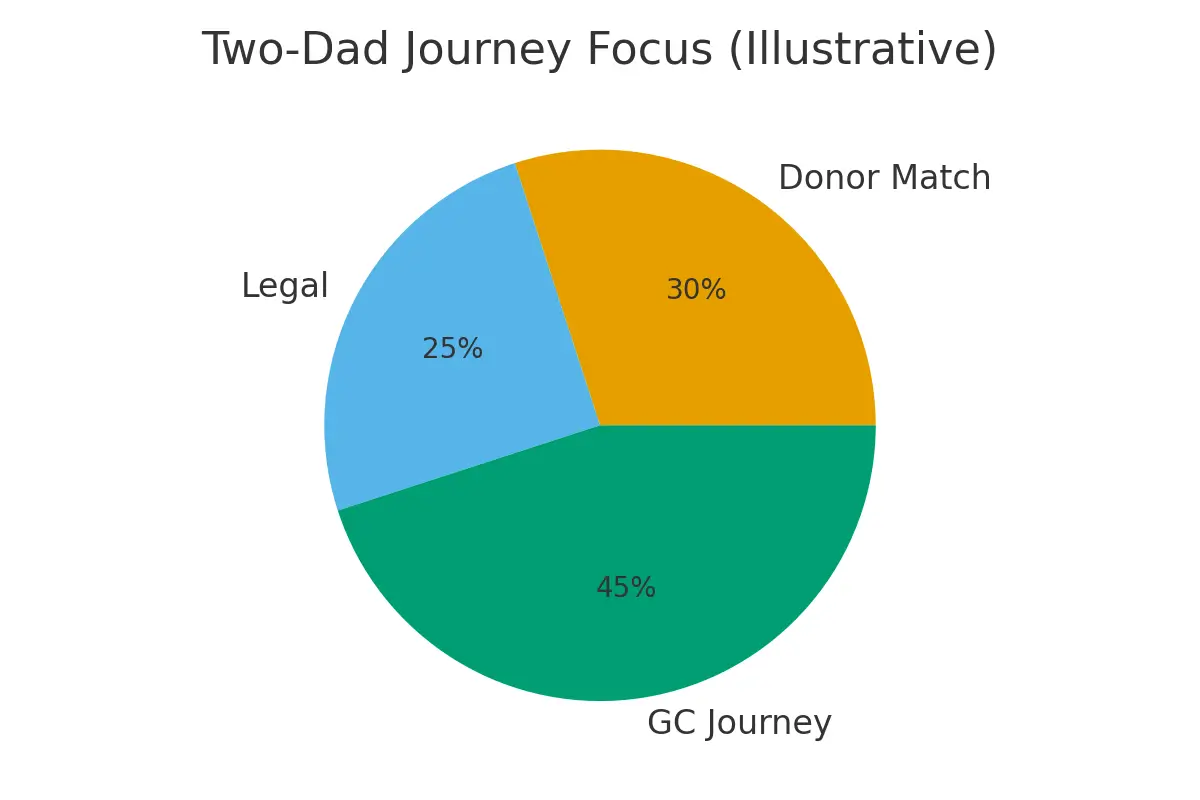
Choosing and matching with a gestational carrier (GC) is one of the most critical steps in LGBTQ+ family building. It directly impacts outcomes, costs, and timelines. This guide explains the essentials—screening, legal steps, logistics, and emotional considerations—so you can move forward with confidence.
What It Is
Gestational carrier screening and matching ensure that the person carrying your pregnancy is medically, emotionally, and legally ready. Early choices—such as agency selection, medical criteria, and legal agreements—set the stage for smoother cycles, healthier pregnancies, and fewer unexpected costs.
Who It Helps
Gestational carrier matching is best for:
- LGBTQ+ parents who require a carrier to achieve pregnancy
- Intended parents with medical, surgical, or uterine factors preventing safe pregnancy
- Families navigating prior failed transfers, recurrent loss, or medical contraindications
In other cases, alternatives such as self-carry, embryo donation, or adoption may be better suited.
Step-by-Step Approach
A structured pathway reduces stress and avoids costly delays:
- Initial Screening – medical, psychological, and legal clearance for the GC
- Carrier Matching – aligning values, expectations, and communication styles
- Legal Documentation – contracts protecting both carrier and intended parents
- Clinic Coordination – syncing calendars, medication schedules, and transfer timing
- Embryo Transfer & Monitoring – careful tracking of early pregnancy and ongoing care
Pros & Cons
Pros:
- Creates a safe, structured path to parenthood
- Protects embryo quality with medical and uterine screening
- Provides emotional reassurance through legal and psychological safeguards
Cons:
- High costs, including carrier compensation, legal fees, and medical bills
- Longer timelines due to screening, contracts, and coordination
- Emotional complexity around shared responsibility and trust
Costs & Logistics
- Line Items: carrier compensation, agency fees, medical costs, insurance, legal contracts
- Insurance & Authorizations: critical for covering maternity care and unexpected events
- Cash Flow: escrow accounts protect both parties; budgets must account for contingencies
- Tracking: clear timelines and checklists prevent billing or scheduling surprises
What Improves Outcomes
Evidence-based practices that truly make a difference:
- Carrier Screening Standards – ensures uterine health and safety
- Genetic & Infectious Disease Testing – protects embryo and pregnancy outcomes
- Legal Documentation – prevents disputes and clarifies responsibilities
- Clinic Calendar Alignment – synchronizes medication timing and transfer dates
- Mental Health Support – strengthens trust and communication throughout the process
Case Study
One couple faced repeated delays due to mismatched calendars and incomplete carrier screening. By shifting to a structured plan—with early legal agreements, escrow tracking, and clinic-aligned scheduling—they reduced stress, avoided financial surprises, and achieved a successful transfer within months.
Mistakes to Avoid
- Rushing into a match without thorough screening
- Delaying legal contracts or insurance authorizations
- Overlooking the carrier’s psychological readiness
- Failing to budget for escrow, maternity care, or contingencies
- Ignoring mental health support for both carrier and intended parents
FAQs
Q. What does gestational carrier screening involve?
Ans : It includes medical evaluations (labs, imaging, uterine assessment), infectious disease testing, and psychological screening.
Q. How long does GC matching usually take?
Ans : Typically 3–6 months, depending on agency availability, legal timelines, and clinic scheduling.
Q. What legal protections are required?
Ans : Contracts clarify roles, responsibilities, financial terms, and parental rights before embryo transfer.
Q. How much does working with a gestational carrier cost?
Ans : Costs range from $80,000–$150,000+, depending on carrier compensation, agency fees, insurance, and clinic costs.
Q. How do I ensure a strong relationship with my carrier?
Ans : Clear communication, aligned expectations, mental health support, and ongoing agency or clinic mediation help maintain trust.

Dr. Kulsoom Baloch
Dr. Kulsoom Baloch is a dedicated donor coordinator at Egg Donors, leveraging her extensive background in medicine and public health. She holds an MBBS from Ziauddin University, Pakistan, and an MPH from Hofstra University, New York. With three years of clinical experience at prominent hospitals in Karachi, Pakistan, Dr. Baloch has honed her skills in patient care and medical research.





